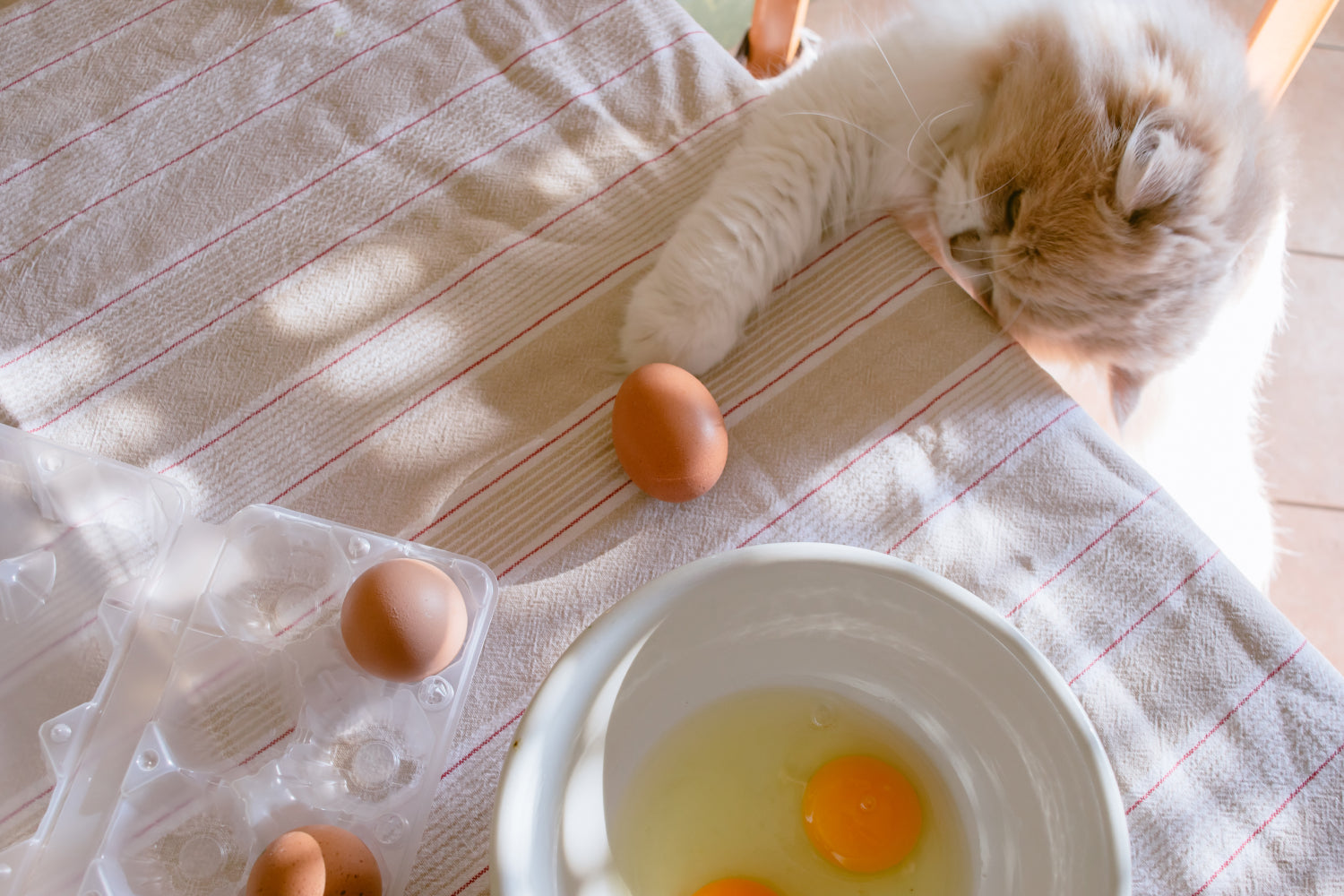13 Most Playful Cat Breeds: What You Need To Know
19-12-2023 By Bridget Reed

If your feline friend has ever taken an interest in your plate of scrambled eggs, you might have found yourself wondering, can cats eat eggs safely? Everyone knows cats can safely snack on chicken, but what about eggs? Luckily for you and your furry friend, the answer is yes, cats can eat eggs.
Now that you know your feline can eat eggs, there are still a lot of questions to be answered. This article will provide you with in-depth information about the health benefits of eggs for your cat, how you can safely prepare eggs for your feline, and how much of their diet eggs should make up.
Yes, your cat can eat eggs! Eggs are considered a superfood and can be a delicious, tasty treat for your four-legged friend. Cats are obligate carnivores, meaning their diets have to consist mostly of animal protein because they can only metabolize the fatty acids from animal protein. Egg whites are full of animal protein, and yolks are full of healthy fat, so eggs are a nutritious snack for your cat.
Eggs are so healthy for cats that many cat food manufacturers mix eggs in the recipe for their dry food and treats to increase the amount of protein in their products.
Like adult cats, kittens can also eat eggs in small amounts. However, you should never feed your kitten or adult cat a diet composed entirely of eggs. Kittens need a specific diet to support all the growth and development in those first six months.
If you want to add eggs to your kitten's diet, it may be a good idea to talk with your veterinarian first to ensure that you are feeding them a well-balanced diet.
Yes, you can safely feed your cat eggs, but should you? Although nutritious, high-quality cat food will give your feline friend all of the vitamins and nutrients they need, the occasional treat or food topper helps to add variety to their diet.
Eggs make the perfect special treat because they are full of nutrients that will keep your feline happy and healthy.
Some of the benefits of eggs for your cat include:
Generally speaking, felines tend to enjoy eggs. However, as a pet parent to a cat, you know that cats are picky, fickle creatures. Although most cats like eggs, you should try gradually introducing them into your cat's diet to see if they enjoy the flavor.
We’ve established that eggs are a superfood for your furry friend, so how can you safely feed them to your cat? The best way to prepare eggs for your cat is by scrambling or boiling them. Regardless of how you prepare the eggs, always cook them without salt or seasoning.
Given that adding eggs to your cat’s diet will be a significant change, you may want to consider talking to your veterinarian first. When you prepare an entire egg (whites and yolk) for your feline, you increase the amount of fat and calories in their diet. Although the fats found in egg yolks are healthy, they may be unhealthy for felines already overweight or obese.
If you are already struggling to control your cat’s weight, your vet may suggest a different snack or food topper. Alternatively, they may suggest that you only feed your cat egg whites. Egg whites are full of animal protein but contain almost no fat, making them the perfect treat for your four-legged friend struggling to lose weight.
Although eggs are healthy and beneficial for cats, raw eggs are not. You should avoid giving your cat any form of raw egg, including eggs cooked over easy. The reason you should keep your furry friend away from raw eggs is that they may contain bacteria called salmonella. Both humans and cats can get sick from salmonella, which can lead to uncomfortable and painful symptoms such as vomiting and diarrhea.
Even if you are just feeding your cat egg whites, you should still always make sure to cook them thoroughly. Avidin is a biotin-binding protein found in egg whites that prevents biotin absorption. When you cook egg whites, this protein becomes inactive. Given that your cat needs biotin for their overall health, you want to make sure to inactivate the avidin in egg whites.
You don’t need to give your cat a lot of eggs for them to feel the benefits. As a rule of thumb, approximately one tablespoon of egg whites on top of your cat’s normal diet can help boost their protein levels without unbalancing their diet.
If you want to give your cat egg whites and yolks, you will need to give them slightly less. Make sure to talk with your doctor before introducing eggs into your feline’s diet. It’s always beneficial to remember that treats and food toppers should only make up 10 percent of your furry friend’s diet.
Eggs are a healthy, tasty treat you can safely give your feline friend in moderation. If you want to incorporate eggs into your cat’s diet, cook them thoroughly without salt or seasonings.
For furry friends who are overweight or at risk of becoming overweight, you can consider giving them only egg whites. Regardless of how you prepare eggs for your cat, remember that they should always make up a small portion of your furry friend’s diet and should be served alongside high-quality dry food.
Sources:
Taurine deficiency syndrome in cats | NIH
Biotin deficiency in the cat and the effect on hepatic propionyl CoA carboxylase | NIH
Shipping Text / Shipping Price